Prison Law and Policy Program: Fostering a Generation of Scholars Who Shine a Light Behind Bars
UCLA Law Magazine | Fall 2023 | Volume 46
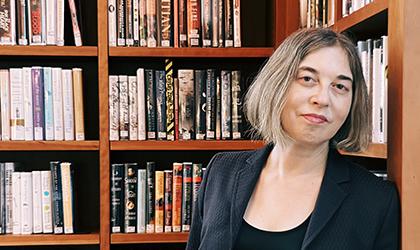
As the cutting-edge Prison Law and Policy Program nears its 10-year anniversary at UCLA Law, its faculty director, Sharon Dolovich, reflects on her early days as a trailblazing scholar in the field.
“The law school was very supportive, but I always felt the work I was doing was perceived as a little out there,” she says with a laugh.
In 2000, Dolovich joined the faculty at UCLA Law. Since then, she has been on a crusade to transform the way criminal law is taught at American law schools, broadening it from a “front end” approach – a focus on investigation, prosecution and verdict – to a holistic one that also encompasses “back end” criminal punishment. “I want every future lawyer who comes to law school to know prisons are something they should care about,” she says.
To know why Dolovich cares, we have to go back to her law school days.
Dolovich earned a Ph.D. in political theory from Cambridge University before heading to Harvard Law School. She was always interested in criminal law but knew she didn’t want to be a trial attorney.
As a 1L, she was turning the pages of a guide on criminal justice careers. Every summer job that was listed had to do with the front end of the system. Then, she found it: ACLU’s National Prison Project (NPP) summer program. She spent her 1L summer with NPP, then back at Harvard wrote a paper on private prisons she eventually published in the Duke Law Journal.
“The more I learned about prisons, the more compelling and urgent the issues seemed. My dedication to this field is a combination of deep intellectual and theoretical interest and a strong sense of moral imperative,” she says.
In her 2012 manifesto, “Teaching Prison Law,” she wrote, “In the United States, the law school has become the place where the law’s full scope—and thus, the exercise of state power—is revealed, examined, and critically assessed. For law schools to omit the law of prisons from their otherwise capacious course offerings is to … keep prisoners invisible to the very people—future lawyers— best positioned to help vindicate their legal rights.”
At UCLA Law, she has built both a curriculum and related initiatives that ensure prisoners are visible. What follows is a timeline of the most important steps Dolovich and UCLA Law have made to make the law school a destination for future lawyers who care about prisoners’ rights.
In 2014 Dolovich launched UCLA’s Prison Law and Policy Program. Through coursework, programming, outreach initiatives including the Incarcerated Persons Correspondence Project, and experiential education, students explore how the law structures all aspects of the contemporary experience of incarceration in the United States. Dolovich also coordinates Prison Law JD, a national network of law students and recent law school graduates interested in careers in the field.
As the program nears its 10-year anniversary, Dolovich believes this work has never been more important. The past four decades have seen unparalleled growth in the impacted population. Today, there are close to two million people in custody in state and federal prisons and jails in the United States, and another five million or so on probation or parole.
In 2016, after a full year of planning, Dolovich hosted the biannual National Prisoners’ Advocates conference. The event brought to campus more than 200 prisoners’ rights lawyers and other advocates for the incarcerated for three days of panels and presentations focused on pressing issues in prison law.
“The conference put UCLA Law on the prison law map. Since that time, we have placed countless students in the leading prisoners’ rights organizations in the country,” Dolovich says.
One such student is Jaclyn Kurin ’19, who is currently a staff attorney at the Abolitionist Law Center in Pittsburgh. Kurin earned her LL.M. at UCLA Law, where she was involved in the Civil Rights and Police Accountability Clinic and Tribal Appellate Court Clinic.
Now, she works with impacted people to change the narrative about jails through litigation, community organizing, legislation and media efforts. Her work has led to several important reforms, including—for the first time in U.S. history—helping county voters pass a referendum banning solitary confinement, and ending the use of chemical agents and the torturous restraint chair in the local jail.
“The Prison Law and Policy Program lived up to its reputation for humanizing the incarcerated and training the next generation of lawyers to advocate for their civil rights. I learned from professors at the top of their field, practitioners and impacted community members about the issues affecting incarcerated people and how to fashion and pursue compelling claims to obtain legal relief for their mistreatment,” Kurin says. “Stellar professorial guidance, participation in clinics and an excellent group of peers aided my career development.”
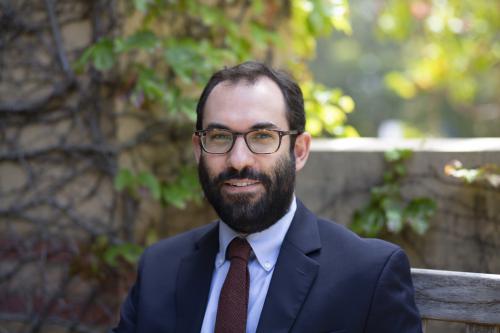
In 2019, UCLA Law expanded its expertise in prison law by bringing on Aaron Littman, who spent three years at the law school as a Binder Clinical Fellow where he started the Prisoners’ Rights Clinic. In 2022, he was named an assistant professor. His scholarship, teaching and public service are deeply connected to his experience as a civil rights litigator at the Southern Center for Human Rights in Atlanta.
When the pandemic hit in 2020, Dolovich launched a unique data collection effort, the COVID Behind Bars Data Project (now called the Behind Bars Data Project), which tracked the impact of COVID-19 in prisons, jails and other U.S. carceral facilities. Littman quickly joined the effort as deputy director.
In its first 18 months, the project’s data was cited in over 200 news stories; federal public defenders utilized it as a first step in trying to get their most vulnerable-to-COVID clients out of prison; and litigators relied on it in their class action suits to release aging prisoners.
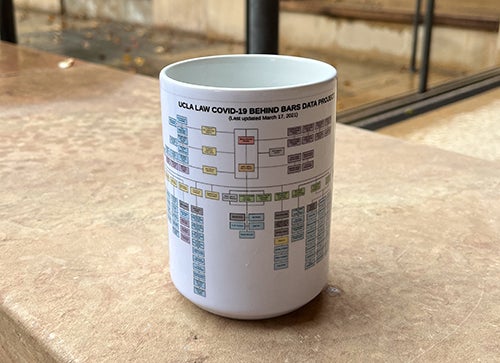
Earlier this year, furthering the mission of the Prison Law and Policy Program, UCLA Law launched a partnership with the MacArthur Justice Center (MJC) to train the next generation of prisoners’ rights advocates. MJC attorneys Daniel Greenfield and Megha Ram, who come from the center’s Supreme Court and Appellate Program, are now working alongside Littman to teach and mentor students participating in the Prisoners’ Rights Clinic. There, students are gaining direct experience in appellate litigation by representing incarcerated people, including MJC clients, who have raised civil rights claims in federal courts of appeals. Students participate in every aspect of the appeals, consulting with clients, researching the law and drafting briefs.
As Dolovich prepares for a slate of anniversary programming next fall, one of the things she is looking forward to most is bringing alumnus Frankie Guzman ’12 and his brother Freddy Guzman to campus for a panel discussion. Frankie is currently the senior director for youth justice at the National Center for Youth Law, where he leads a team of attorneys, policy advocates and community organizers to transform youth justice systems in California and Colorado. While Frankie was at UCLA studying law, Freddy, who had been incarcerated for decades after entering prison as a teenager in the 1980s, was hoping to be released on parole. With Dolovich’s support, a team of UCLA Law students—calling themselves Team Freddy—worked with leading parole lawyer Keith Wattley on Freddy’s behalf, and in 2018 Freddy was released on parole.
As for the future of the program, Dolovich wants more students coming to UCLA Law to study prison law and policy, she wants to find additional ways to support them, and she wants to continue to challenge the legal academy to focus on prisons.
Meet the Next Generation
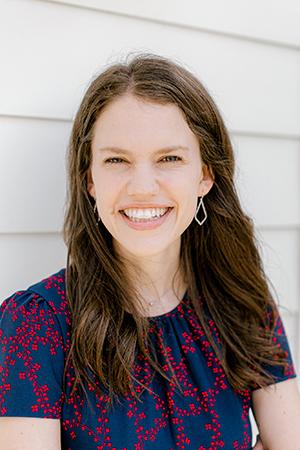
Anna Norkett Kao ’24 was inspired to go to law school because her brother had been incarcerated. When she met Dolovich and learned about the Prison Law and Policy Program, it all clicked.
“I have learned from the greatest professors in this field and developed relationships with classmates who are dedicating their lives to helping those most vulnerable. Daily, I’m surrounded by people who inspire me, challenge me, lament with me, hold me accountable and encourage me to keep going. The opportunities I’ve had to jump into this work even as a student are incredible and will forever shape me as an advocate,” she says.
Norkett Kao has been involved in several initiatives under the umbrella of the program, including the Behind Bars Data Project, the Prisoners’ Rights Clinic and the Incarcerated Persons Pen Pal Project, which she led last year through the Law Students for Decarceration group.
After graduation, she hopes to gain experience in litigation and eventually become a professor of prison law and policy at a law school in Texas.
“I’d like to equip and inspire the next generation of advocates for the incarcerated, as I have been equipped and inspired at UCLA. I’ve watched as a few key professors have shaped dozens— even hundreds—of students over the years into passionate, skilled advocates for the incarcerated, and I would love to bring similar opportunities to students in a different part of the country,” she says.
UCLA Law Students Publish Report on Conditions in California Prisons During the Pandemic

In 2023, UCLA Law’s Prison Accountability Project, led by a team of student researchers, published a report that details incarcerated individuals’ experiences in California Department of Corrections and Rehabilitation (CDCR) facilities during the height of the COVID-19 pandemic.
Supported by their faculty advisor, Dolovich, the report’s co-authors—third-year students Nora Browning, Joseph Gaylin, Shireen Jalali-Yazdi and Kamilah Mims—and a team of student volunteers transcribed and coded hundreds of calls and letters from people incarcerated in 28 CDCR facilities between April 2020 and April 2021, utilizing data provided by UCI’s PrisonPandemic project.
They identified routine medical abuse and neglect, unsanitary conditions, extreme isolation and physical violence directed at incarcerated individuals, often unreported by official oversight bodies.
“In the absence of rigorous external oversight that centers the experiences of incarcerated people, my hope is that [this project] can provide advocates, lawyers and organizers with accurate information about widespread problems in California carceral institutions,” says Gaylin ’24, co-author of the report and founder of the Prison Accountability Project. Gaylin came to UCLA Law specifically for its Prison Law and Policy Program.
Building the Prison-to-University Pipeline
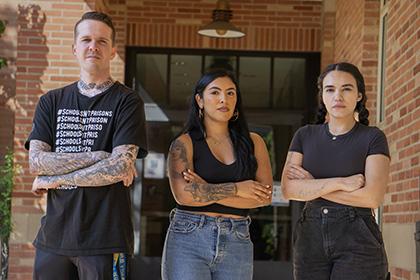
“Everyone is impacted by mass incarceration, whether they realize it or not,” says Brisely Martinez ’24.
Martinez is passionate about seeing more formerly incarcerated and systems-impacted people in the legal profession. She is a co-founder and co- president of the Alliance for Formerly Incarcerated and System Impacted Students (AFISIS), a new student-led group at UCLA Law focused on increasing the prison to university pipeline. Alicia Virani, the Rosalinde and Arthur Gilbert Foundation Director of UCLA Law’s Criminal Justice Program, is the group’s faculty advisor.
Martinez is ‘systems impacted’ herself – that is, she has loved ones who have been impacted by the criminal legal system, mass incarceration and the hyper-criminalization of communities of color.
“For folks who have experienced anything in the criminal legal system, know that we are here; we exist, and we deserve to have access to the privilege of higher education,” she says.
AFISIS aims to help systems-impacted individuals from both the outside and the inside. Their goals include increasing the visibility of systems- impacted law students; creating pathways for formerly incarcerated and systems-impacted students to attend law school; and addressing the ways law schools and the legal profession themselves hinder those pathways.
Martinez is specializing in critical race studies and is a mentor in UCLA Law’s Law Fellows program, of which she is an alumna.
“My community is not just my ethnicity – it’s also people who have experienced the injustices that I have experienced. You don’t often think of diversity this way, but — to me — it is an identity, and to a lot of us it is,” she says. “When law schools talk about diversity, our voices and our community should be included in those conversations.”